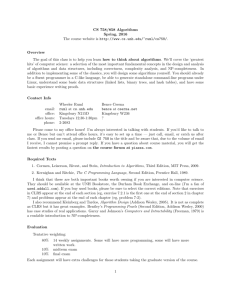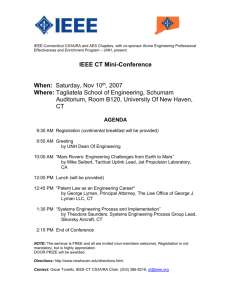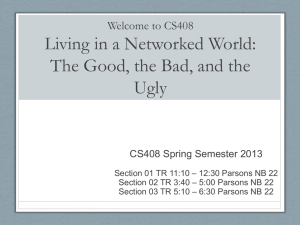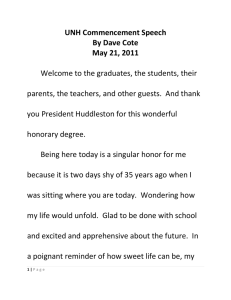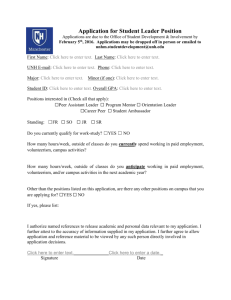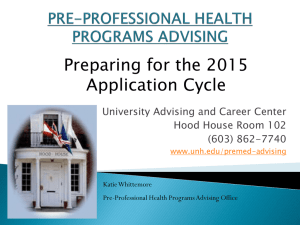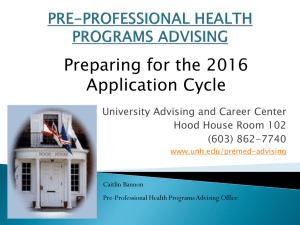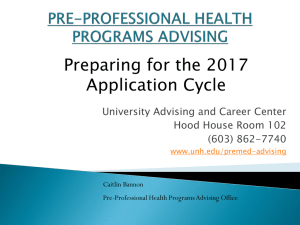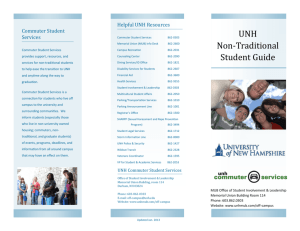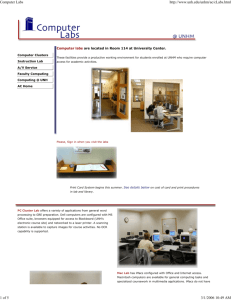CS 730/730W/830: Introduction to Artificial Intelligence Spring, 2009
advertisement
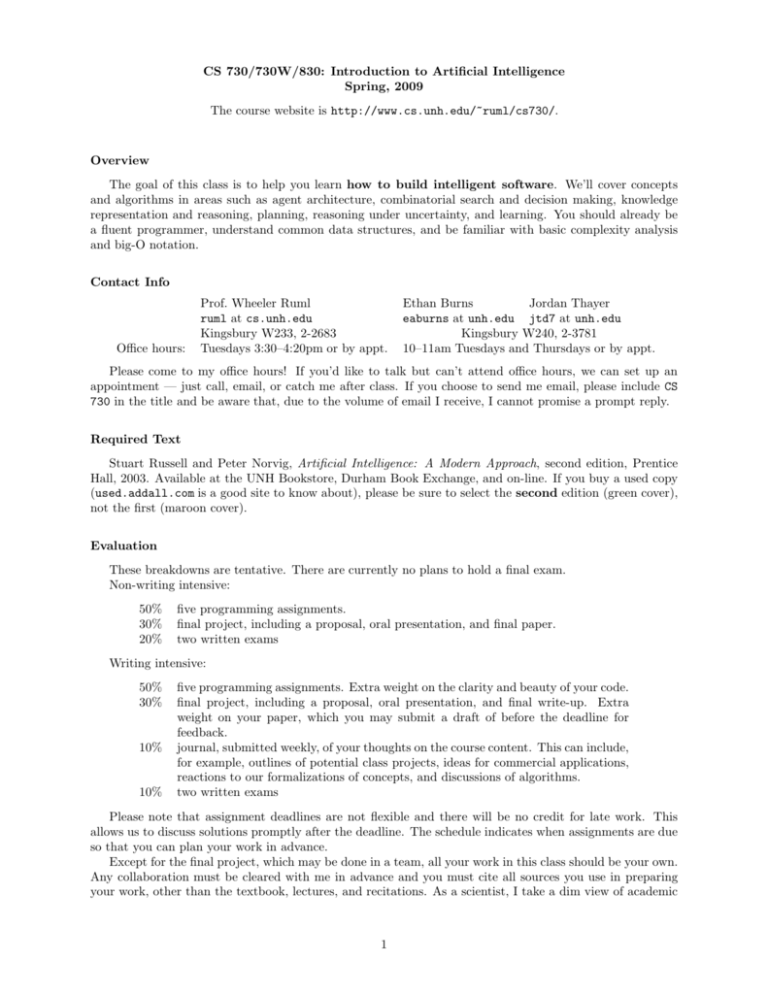
CS 730/730W/830: Introduction to Artificial Intelligence Spring, 2009 The course website is http://www.cs.unh.edu/~ruml/cs730/. Overview The goal of this class is to help you learn how to build intelligent software. We’ll cover concepts and algorithms in areas such as agent architecture, combinatorial search and decision making, knowledge representation and reasoning, planning, reasoning under uncertainty, and learning. You should already be a fluent programmer, understand common data structures, and be familiar with basic complexity analysis and big-O notation. Contact Info Office hours: Prof. Wheeler Ruml ruml at cs.unh.edu Kingsbury W233, 2-2683 Tuesdays 3:30–4:20pm or by appt. Ethan Burns Jordan Thayer eaburns at unh.edu jtd7 at unh.edu Kingsbury W240, 2-3781 10–11am Tuesdays and Thursdays or by appt. Please come to my office hours! If you’d like to talk but can’t attend office hours, we can set up an appointment — just call, email, or catch me after class. If you choose to send me email, please include CS 730 in the title and be aware that, due to the volume of email I receive, I cannot promise a prompt reply. Required Text Stuart Russell and Peter Norvig, Artificial Intelligence: A Modern Approach, second edition, Prentice Hall, 2003. Available at the UNH Bookstore, Durham Book Exchange, and on-line. If you buy a used copy (used.addall.com is a good site to know about), please be sure to select the second edition (green cover), not the first (maroon cover). Evaluation These breakdowns are tentative. There are currently no plans to hold a final exam. Non-writing intensive: 50% 30% 20% five programming assignments. final project, including a proposal, oral presentation, and final paper. two written exams Writing intensive: 50% 30% 10% 10% five programming assignments. Extra weight on the clarity and beauty of your code. final project, including a proposal, oral presentation, and final write-up. Extra weight on your paper, which you may submit a draft of before the deadline for feedback. journal, submitted weekly, of your thoughts on the course content. This can include, for example, outlines of potential class projects, ideas for commercial applications, reactions to our formalizations of concepts, and discussions of algorithms. two written exams Please note that assignment deadlines are not flexible and there will be no credit for late work. This allows us to discuss solutions promptly after the deadline. The schedule indicates when assignments are due so that you can plan your work in advance. Except for the final project, which may be done in a team, all your work in this class should be your own. Any collaboration must be cleared with me in advance and you must cite all sources you use in preparing your work, other than the textbook, lectures, and recitations. As a scientist, I take a dim view of academic 1 dishonesty and UNH policy provides for actions starting with failing the course and including dismissal from the University. If you are registered with the student disability office, please let me know right away so that I have time to provide proper accommodation. Mechanics Programming assignments: You may use any programming language you wish in this course. We will give you example inputs for your programs that indicate the sort of problems your solutions will be tested on. You code must run on a standard modern Linux machine such as agate.cs.unh.edu. See the submission handout for make script requirements and instructions on submitting. You will also hand in a hardcopy listing of your source code (2 pages per page, as with a2ps -2) and a brief write-up the next day in class. For each assignment, 10% of the grade will be calculated from a ‘milestone’ solution, usually due a week before the full solution, that will exhibit only partial functionality. While only students in the writing intensive version will be explicitly graded on code beauty, please note that it is in your best interest that we be able to quickly understand your code so that we can try to give you partial credit if your program doesn’t behave as nicely as our solution does. You want your grader to be happy! Please bring any questions regarding grades or comments on your work to our attention as soon as possible. You may ask that any of your work be regraded up to 7 days after it is handed back. Written exams: Held during common exam time (see schedule for dates). No notes or books permitted. You may bring a calculator for the second exam if you’d like. Final project: You may work in teams of up to three people on the final project. The project is intended to be an implementation and evaluation of one or more algorithms, but feel free to consult me if you would like to undertake a different kind of project. The topic must relate to the course (for example, it should appear in the textbook somewhere) but otherwise you may propose any topic you wish. Feel free to submit your project proposal well before the deadline, but wait until I’ve approved it before starting serious implementation work. The proposal must specify what you intend to do, why it is interesting, who is responsible for each portion of the work, and what references and other sources you will rely on. The final paper contributes the vast majority of the project grade. You will submit any source code you write, but the write-up is what will be graded. It should clearly state the problem that the project addresses, discuss the methods employed in solving the problem, evaluate their performance and adequacy, and relate them to other existing possibilities. You should also mention possible extensions of your project and things you would have done if you had more time. If you are in the writing-intensive version, you are strongly encouraged to discuss a draft with me several days before the due date. Just before exam period, each project team will give a 15 minute oral presentation of their project and the results obtained so far. Journal (writing intensive only): Please email me an entry of at least 300 words each week before 2:10pm Tuesday. This can be plain text, PDF, or the URL of a blog. Journal entries need not make a formal academic argument, but should have correct spelling and grammar, be coherent, and relate to specific topics discussed in the course. They should not be merely how you felt about a topic, but a critique or extension of an idea. One possiblity is to use your entries to think about potential project ideas. Other possibilities include critiquing the algorithms presented in class, proposing new algorithms, or outlining possible applications of AI. If you are unsure if a particular topic is appropriate for a journal entry, feel free to ask. 2
